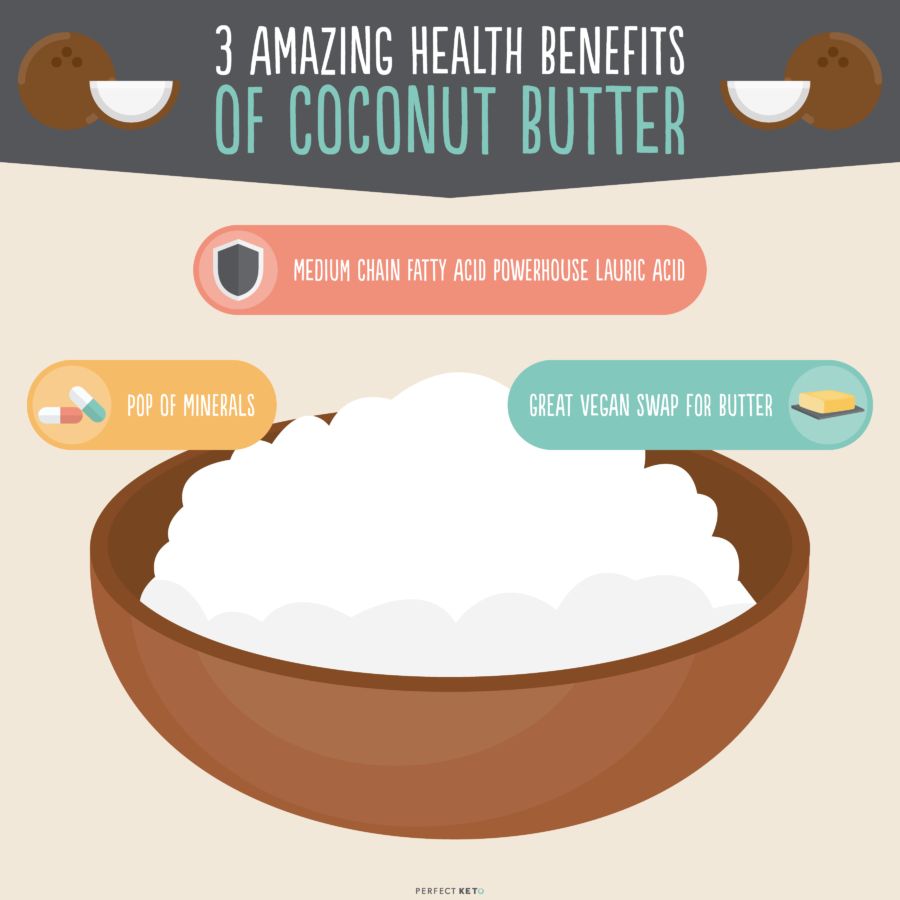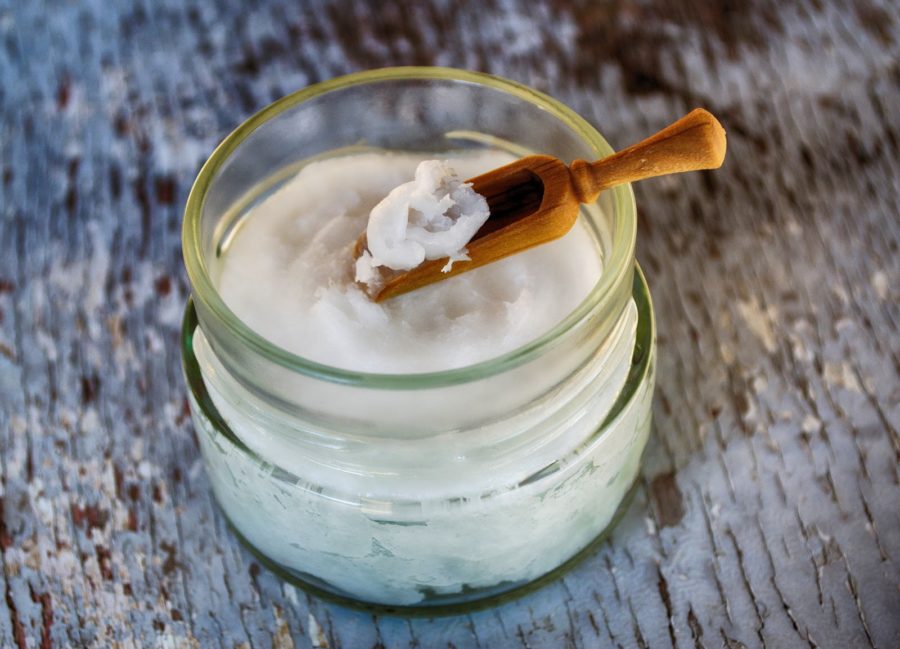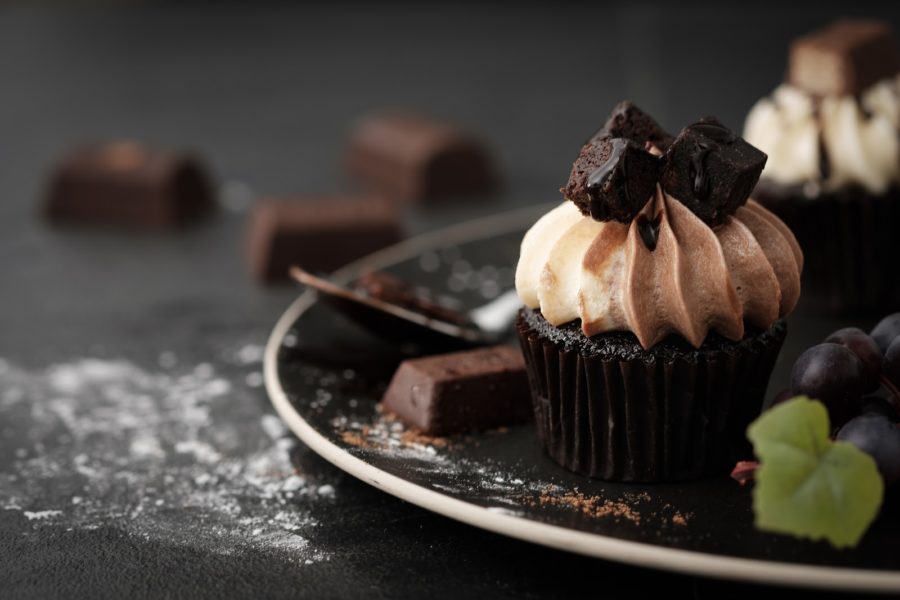Crazy as it may sound, coconut butter may be good, if not great for your cardiovascular health.
This goes against everything we’ve been taught to believe about saturated fats for the last 30 years, but the science is stacking up in support of coconut’s many health benefits. Furthermore, it looks like those well meaning recommendations were all but carved in stone when they were not the whole story.
Drama aside, let’s dive into the creamy, delicious, heart-health boosting truths about coconut butter.
Recent studies are bucking the misconceptions that saturated fats, like those found in coconut are bad for you.
- A study released in March of 2018 showed that consumption of coconut oil actually significantly increased HDL cholesterol with results comparable to olive oil and hypothesized it was due to coconut oil’s monounsaturated fat content[*].
- An animal study slated for publication in May 2018 showed that supplementation of virgin coconut oil went above and beyond the duty of improving lipid profiles but also showed benefits to kidneys, liver and cardiovascular system[*].
- The polyphenol content of virgin coconut oil proved to protect cells from pro-oxidant insults by way of modulating the cells’ antioxidant usage in a 2017 study[*].
Those studies are just a snippet of what science has to say about coconut’s health benefits. When it comes to coconut butter, you get the benefits of both coconut oil and compounds found in the coconut meat because it’s made from the meat, rather than exclusively to extracted oil.
You’re going to want to read on because these health benefits are delicious to come by.
First Off, What Is Coconut Butter? Is It Different Than Coconut Oil?
Given the name and how coconut oil turns solid at cooler temps, it would be easy to assume that coconut butter is simply cold coconut oil. But you know what they say about assuming. In this case it would prove to be at least partially true.
Coconut oil is made by removing the oil from coconut meat — the white flesh of a coconut. There are a variety of ways to do this, but that’s best saved for an article exclusively on coconut oil. We’re here for the butter.
Coconut butter is made by taking dried coconut flakes or dessicated coconut and blending them to create the creamy wonder that is coconut butter. It’s worth pointing out that dessicated means dried, but generally when purchasing coconut products this term is used to denote finely shredded, dried coconut.
Coconut butter is a single ingredient product that is 100% vegan, dairy free, gluten free, everything-but coconut free. If you rush out to the store immediately after finishing this to buy some make sure there is only ONE ingredient on the ingredient panel — coconut. Anything else is nonsense.
If you decide you want to make your own at home purchase single ingredient, desiccated coconut that is finely shredded and make sure that you have a food processor. Blenders don’t work to make coconut butter because their design kicks the flakes up rather than continually pulling them over and under the mixture.
Tip repeatedly mentioned by the coconut butter DIY experts is to use the whole bag of coconut. Too little coconut in the food processor messes with the blending/churning process.
In summation: blend a whole bag of dried, finely shredded coconut in a legit food processor for 8 to 10 minutes until you create your very own coconut butter. Store in a glass jar for up to 6 months. Pat self on back and enjoy.
The Nutrition of Coconut Butter
Take a backseat olive oil and butter, because coconut butter has some unique qualities you cannot compete with.
Because coconut butter is made from the meat of the coconut, you get all the health benefits, including a pop of protein and hint of minerals, in addition to the coconut buttery goodness.
Here’s the nutritional breakdown 1 tablespoon serving of coconut butter, also known as creamed, shredded coconut flakes[*]:
- 96 Calories
- 3 g Carbohydrate
- 9.6 g Fat
- 1 g Protein
- 0.5 mg Iron (3% DV)
- 13 mg Magnesium (3% DV)
- 29 mg Phosphorus (3% DV)
- 77 mg Potassium (2% DV)
- 0.1 mg Copper ( 6% DV)
- 0.4 mg Manganese (20% DV)
Because coconut butter weighs in with zero net carbs, it’s a highly recommended keto approved food, even though it’s used as an ingredient not generally eaten all by itself.
All of that plus a pop of B vitamins, monounsaturated fatty acids, polyunsaturated fatty acids and antioxidants. This includes the fatty acid that gave olive oil it’s claim to heart health lauric acid.
3 Amazing Health Benefits of Coconut Butter

#1. Medium Chain Fatty Acid Powerhouse Lauric Acid
There’s no need for a fancy segway into lauric acid. Lauric acid can stand on its own and all it does is win, win, win. 12 carbons in length, it’s as long as a fatty acid can be and still be called a medium changed fatty acid.
Lauric acid helps with everything from weight loss to cognitive function to cancer cell slaying. It’s the same fatty acid that brought olive oil in to mass popularity.
A 2017 study found that lauric acid goes sets of the signal in cancer cells to initiate apoptosis – cellular death[*]. That means this MCT gets the cancer cell to push its own self destruct button.
Another study fresh off the presses in April 2018 shows that lauric acid works synergistically with cancer cell specific chemo agent selenite[*]. This is really good news as chemo is notoriously brutal on cancer patients and this translates to a shorter and less harsh form of treatment.
This fatty acid came to rise in popularity over 20 years when it was found to increase HDL, otherwise known as good cholesterol. These days it’s making the news for it’s positive effects on the cardiovascular system, neurons and ketosis[*].
#2. Great Vegan Swap for Butter
For those who follow a plant based diet or are looking to switch to one, coconut butter provides a viable swap for butter. This can also be helpful if you cannot find organic, grass fed butter in your area.
Coconut butter isn’t going to offer up the butyric acid found in butter (well, grass fed), but it does offer up healthy fats and creamy texture. The fat content paired with with the mouth feel help send signals to the brain that you’re full — satiated.
Not only can this help you lose weight because you’re not overeating or hungry when healthy options aren’t available, but it also helps keep you committed to following a keto diet. That is because you create an association between enjoying keto friendly foods and feeling better afterwards.
One of the many reasons that low-fat or no-fat diets fail is because people don’t feel satiated and don’t get the mouthfeel of fat. They constantly feel hungry and keep eating more. Typically what they’re eating more of is carbs.
#3. Pop of Minerals
20% of the manganese you need in a day per tablespoon is impressive. Not so impressive are 2% of the potassium and 3% of the iron, magnesium and phosphorous you need in a day.
At first glance those percentages seem laughable to mention. But on second glance these are nutrients that Americans have trouble getting on their diet and that regular butter wouldn’t be offering up.
So it’s not going to amend a nutrient deficiency, but when paired with other healthy keto foods, it’s going to add up. Plus if you’re making the swap for butter, these nutrients quickly become an added benefit.
How to Buy and Store Coconut Butter
You’ve got options when it comes to coconut butter. You can make your own at home if you have a food processor — the experts say a high-speed blender just won’t work. Or you can mosey on down to your local grocery store and purchase premade coconut butter, which also goes by coconut manna because it’s heavenly.
If you’re purchasing coconut to make homemade butter make sure to purchase unsweetened coconut flakes. It may also be labeled as shredded coconut or desiccated coconut. The key is that the only ingredient is dried coconut and that it’s finely shredded.
When purchasing, make sure there is only one ingredient: coconut. There is no need to add sugar or anything else.
You may notice that there are some nut butter blends out there with coconut butter such as peanut butter or almond butter. Totally up to you if you want to purchase these, but for the most part it’s recommended to buy single ingredients versions of each, that way you can pick and choose how much you want to use and use them each for a wider array of recipes.
Store at room temperature in a cool, dry place like your pantry.
Coconut Butter Safety Concerns
The only real safety precaution with coconut butter is to avoid it if you’re allergic to coconut as it is 100% coconut.
Special word of caution to pet owners, especially of lovable dogs, ask your vet before you share your coconut butter with your fluffy friend. Pets of much smaller organs that we do and thus what seems like a small amount to use can cause pancreatitis in them. Save your coconut butter for yourself and save tons of money on vet bills.
Coconut Butter Recipes
Once you try coconut butter and love it, you’re going to start thinking of endless ways to use it. Yes, it pairs as well as you imagine with dark chocolate. The best place to start is making your own coconut butter.
Your Very Own Homemade Coconut Butter

The key to making your very own coconut butter is to have the right amount of dried coconut flakes and the right food processor. Your food processor needs to be at least 50% full to create the right churning action.
Ingredient:
Dry, Finely Shredded Coconut
Directions:
Place in food processor and blend for 8 to 10 minutes, scraping sides as needed.
Notes:
Store in a glass jar at room temp for up to 6 months.
Keto Coconut Buttercream Frosting

Looking for the perfect frosting to top our Chocolate Keto Birthday Cake recipe? Look no further than this zero net carb, 2 ingredient recipe that you can mix up with a drop or two of your favorite, organic extract. May we suggest almond extract?
Ingredients:
1 cup coconut butter
1 TBSP organic, cocoa powder
Directions:
Simply mix the two ingredients together, either by hand or with a mixer, and then spread over your cake while still soft.
Coconut Butter The Unexpected Keto Hero
The name and flavor seem to good to be true, but this easy to make, zero net carb, delicious ingredient need to be a staple in your keto pantry. Easy to make and just about as easy to find at your grocer. Swap it out in recipes for regular butter or use it to take your next keto dish to the next level in flavor, texture and nutrition.